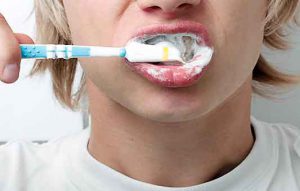 A new research suggests our oral microbiomes are becoming less diverse, and our oral health has declined, with modern diets.
A new research suggests our oral microbiomes are becoming less diverse, and our oral health has declined, with modern diets.
Preliminary findings of an ongoing study conducted in partnership by the University of Melbourne, Doherty Institute and Melbourne Museum suggest that high carbohydrate intake – like added sugar and refined flours – are associated with lower diversity of bacteria in participants’ saliva.
Our mouths contain different types of microorganisms, but most are bacteria: having rich and diverse communities of bacteria is generally good for our health.
This is because varied types perform different roles and can keep each other in check.
Research has revealed that microbes living within and on our bodies, which constitute around one to two kilograms of our bodyweight, contribute to how the body functions.
Around 700 bacterial species have been found in the human mouth, but each of us is likely to be inhabited by around 300 different species.
The bacteria in our mouth interact with each other and with us as their host – they help with digestion, can protect us against pathogens, produce chemicals that are important to our health, and sometimes cause disease.
Depending on what we eat, and how we look after our mouths and health, our oral microbiomes can act as guardians, particularly of our teeth and gums, or as invaders.
Just like us, microbes need food to eat and this is plentiful in the mouth.
Our saliva, what we eat and the waste products of other microbes, all help nourish our oral microbiome.
Microbes often work together. “Similar to the algae and molluscs that build up on the bottom of ships, our teeth and gums provide perfect surfaces for entire communities of microbes to be built,” says Dr Julian Simmons, principal investigator of the study and senior research fellow at the Melbourne School of Psychological Sciences.
“These communities are called biofilms and are usually made up of a range of microbes that like living together.
While some bacteria are initial colonisers, others only move in when conditions are just right.”
We are providing our oral communities with far more sugar and other simple carbohydrates than ever before, and some bacteria convert these sugars into strong acids.
When we consume sugars frequently through the day, acid levels increase, eating away at our tooth enamel and disrupting biofilms.
Dr Byrne, senior lecturer at the Melbourne Dental School, advises that the most effective way to live in harmony with our oral microbiome, and keep our teeth and gums healthy, is to regularly clean the dental plaque from your teeth by brushing twice a day.
Flossing is important too because it removes dental plaque hiding between the teeth.
Antimicrobial mouth rinses are not needed unless recommended by our dentist, as they will remove bacteria that might be important for our health.
Eating a varied and healthy diet is also crucial, for both our oral and gut microbial communities.
It seems the food we now eat the most of, like added sugars and refined flours, doesn’t support the diverse communities of bacteria our mouths need.
When it comes to our microbiome, we really are what we eat.
See also:
Brush your teeth to protect your heart (2020-03-09)
Link…
Oral infections linked to cardiovascular disease (2015-04-22)
Link…
Molecule in human saliva has potential for wound healing (2017/08/30)
Link…
Frequent recreational use of cannabis increases the risk of gum disease (2017-06-01)
Link…
Healthy gums for healthy blood vessels (2011-06-24)
Link…
Marketing, not science, informs notions of healthy teeth (2018-10-23)
Link…
Pesticide exposures can cause changes in oral microbiome (2016-11-22)
Link…
A common bacterium links rheumatoid arthritis and gum disease (2016-12-28)
Link…
“Enzyme in Saliva Helps Regulate Blood Glucose (19/04/2012)
Link…
For more information
The Victorian Oral Microbiome and Lifestyle Study
Link…
Plos Biology
Revised Estimates for the Number of Human and Bacteria Cells in the Body
Link…
MDN
This post is also available in:
 Italian
Italian


